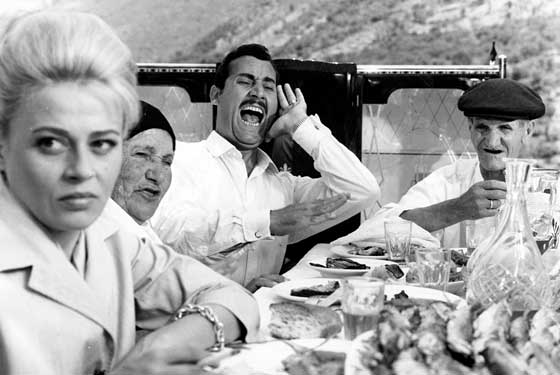|
Reviews of Recent Independent, Foreign, & Documentary Films in Theaters and DVD/Home Video
Directed by: Alberto Lattuada. Produced by: Antonio Cervi. Written (in Italian, with English subtitles) by: Rafael Azcona, Marco Ferreri, Agenore Incrocci & Furio Scarpelli, based on a story by Bruno Caruso. Director of photography: Armando Nannuzzi. Edited by: Nino Baragli. Music by: Piero Piccioni. . Released by: Rialto Pictures. Country of Origin: Italy. 99 min. Not Rated. With: Alberto Sordi, Norma Bengell, Gabriella Conti, Ugo Attanasio, Francesco Lo Briglio & Carmelo Oliviero.
Thomas Wolfe was right. You can’t go home again. Small-town boy Nino has made good in the big city as a foreman at a Fiat plant in Milan, with a beautiful blond wife Marta (Norma Bengell), dressed and coiffed à la Bridget Bardot, and two towhead daughters living in an apartment with the latest appliances. He has traded his bonus for vacation time, taking his family to meet their relatives on the “island of sun and Cyclops” for the first time. (But as a favor to his boss, Nino promises to hand-deliver a small package to the village big shot.) Dressed in the latest fashions, the family’s arrival sparks the entire village’s curiosity, even behind lace curtain as countless pairs of eyes spy upon them during an afternoon stroll. But the disdain Marta has for the south is unavoidable as she bemoans, “We’re not in Italy anymore.” If it’s not the chicken running loose in the living room, it’s her mother-in-law’s frosty stare unnerving her.
Some of the film’s satirical targets are typical, such as Nino’s spinster sister Rosalie with her unibrow and mustache; however, this comedy of
dangerous manners rests on the shoulders of Italian star Alberto Sordi as the unimposing Everyman Nino. Too ingratiating and a bit proud of his
success, Nino overlooks, or refuses to see, the villagers’ machinations. It’s a performance of economy. One look, one expression is enough.
Filmed on location, he, like the viewer, becomes lulled by this colorful, but deceptive travelogue. Even some 40 years after it was made, Mafioso packs heat. Rather than feeling dated, it offers an explanation, or a warning, for the gruesome violence that would rock the island from the ‘70s onward.
Kent Turner
|

